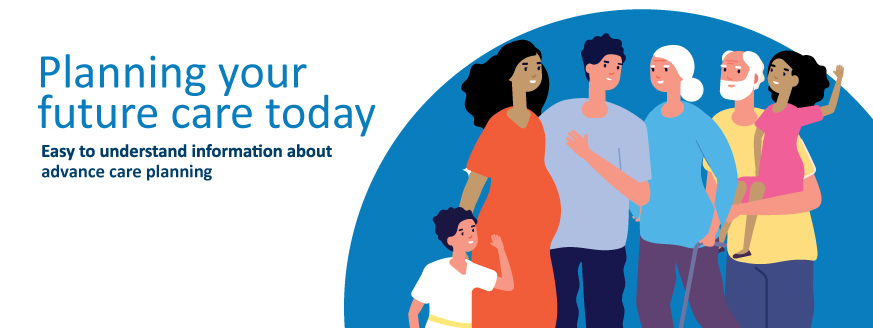



To receive important alerts and updates from Gold Coast Primary Health Network, please submit the form below.
"*" indicates required fields

To receive important alerts and updates from Gold Coast Primary Health Network, please submit the form below.
Have you thought about what your life would look like if you fell sick or had an accident, and could no longer care or speak for yourself? Sometimes you need to think about the different situations you may find yourself in as you move through life. Although you can’t predict the future, you can plan ahead to ensure your health wishes and choices are known by your family, friends, doctors and health professionals.

 |
This short survey is designed to assess the effectiveness of the GCPHN ACP booklet ‘Planning your future care today’. Your feedback is valued as it will help to improve future consumer resources. |
Advance Care Planning (ACP) is the ongoing process of sharing your wishes, beliefs and health choices with your family, friends, doctors and health professionals. You can start Advance Care Planning at any stage of your life, regardless of your age or health status. A plan for the future will prepare you for unexpected illnesses, accidents or emergencies. It will ensure your loved ones and doctors are aware of your choices and can make decisions about the care that you would want.
Five simple steps to Advance Care Planning
Your personal values and beliefs determine what matters most to you in life. They guide the way you live your life and shape the decisions you make. Consider what you would need to live meaningfully and what would be
important to you if you have an accident or fall ill and lost the ability to speak for yourself or make decisions about your care.
You can start thinking about:
The above questions can help you start thinking about what is important to you and start your advance care planning journey.

If you would like to read more, the following websites might be helpful:
|
The following websites and resources can help you start the conversation:
|
To ensure your wishes are carried out and your loved ones, doctors and health professionals understand your choices, you will need to complete and sign advance care planning documents. To complete your forms, your documents require discussions and sign off by:
The Enduring Power of Attorney only has legal authority in Queensland as each state and territory has different legislation and documentation. You will need to be 18 years or older and have decision-making capacity.

What is decision-making capacity?
Capacity is a legal term that refers to the ability to exercise the decision-making process to make informed decisions about personal health and financial matters. All adults are presumed to have capacity to make decisions unless it can be shown otherwise.
A person with decision making capacity can:
You can find more information about decision making capacity in the Queensland Capacity Assessment Guidelines 2020.
What ACP documents do I need to complete in Queensland?
An Enduring Power of Attorney (EPOA) is a Queensland legal document you complete to appoint a person/s you trust (your Attorney) to make financial and/ or personal and health decisions on your behalf when you’re unable to. For example, in the event of serious illness or injury and you can’t speak for yourself.
If you appoint an attorney for:
There are two separate EPOA forms:
You can cancel (revoke) your Enduring Power of Attorney at any time while you have the capacity to make decisions. To revoke your EPOA you must complete the Revocation of an Enduring Power of Attorney Form.
The Enduring Power of Attorney – Explanatory Guide provides detailed information about how to complete your EPOA form. It also has a checklist of steps that you need to complete to ensure your EPOA form is valid.
Remember: Immediately after your death, your Enduring Power of Attorney stops, and your Will comes into effect.
| How to ensure my EPOA form is legally binding?
To ensure your EPOA form is legally binding you need to:
|
Advance Health Directive (AHD)
An Advance Health Directive is a Queensland legal document that records your future health care choices. It will only take effect if you don’t have capacity to make health choices or communicate your wishes.
When completing the document, you’ll be able to provide:
| What are life sustaining treatments?
These treatments support you when you’re seriously ill or at the end of life. These treatments can prolong your life even when your body organs stop working well. Some of these treatments are:
|
The Advance Health Directive – Explanatory Guide provides detailed information about how to complete your AHD form. It also has a checklist of steps that you need to complete to ensure your AHD form is completed correctly and valid.
| How to ensure my AHD form is legally binding?
To ensure your AHD form is legally binding you need to:
|
Statement of Choices (SoC)
The Statement of Choices is a non legally binding values-based document in which you can record your views, wishes and preferences for future health care. This is valuable information for your loved ones, doctors and health professionals to know if you cannot communicate your choices.
It is used in Queensland public hospitals and health care facilities, residential aged care facilities and general practice.
There are two type of forms that can be completed:
Remember: Discuss the Statement of Choices with your doctor/nurse practioner, sign the form and ask your doctor/nurse practioner to sign it.
Where can I find Advance Care Planning forms?
|
Once your documents are completed, signed, dated, and witnessed as per requirements, you are encouraged to:
The OACP uploads your completed Advance Care Planning documents to your Queensland Health electronic hospital record. This ensures your GP, Queensland Ambulance Services, hospital and residential aged care facilities have access to these documents.
Send your documents via:
Email: acp@health.qld.gov.au
Fax: 1300 008 227
Post: PO Box 2274, Runcorn Qld 4113
The OACP will review your documents and if they are incomplete or any changes are needed, they will let you know via email.
Remember
|
As circumstances can change, you may want to update your documents and forms. Your Advance Care Planning documents should be reviewed:
Remember
|

So we can provide you with the most accurate information,
please tell us a little more about yourself

